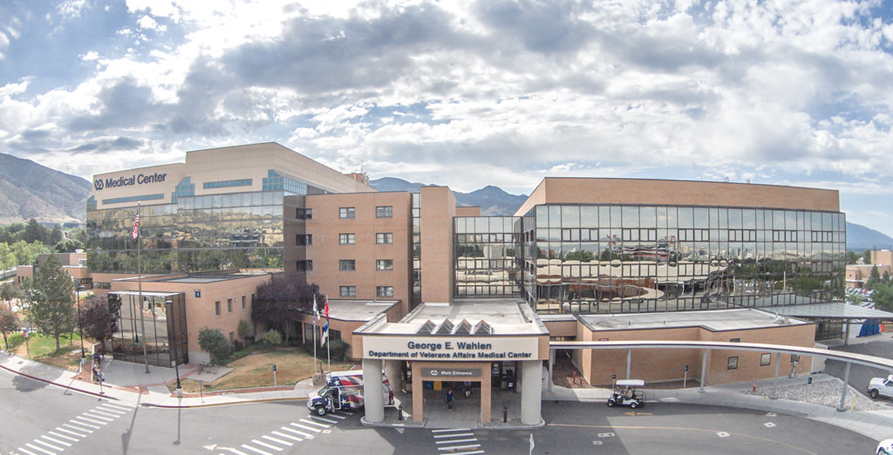Salt Lake City Veterans Affairs Medical Center, Salt Lake City, Utah
Primary Eye Care/Cornea Contact Lens Residency Program
Salt Lake City Veterans Affairs Medical Center (VAMC)
Program Established: 2002
Positions: 2
Program Length: 12 Months
Residency Start Date: July 1, 2026
Required in processing, training, etc., typically starts mid-June 2026
Status: Accredited

Salt Lake City VA Residency program
The Salt Lake City VA Primary Eye Care/Cornea Contact Lens Residency delivers a unique learning experience where residents get a great mix of ocular disease, specialty contact lens and primary care optometry in a multi-specialty medical environment. The program offers two positions for individuals who are highly motivated and enthusiastic. These individuals must be self-driven, organized and want to become an outstanding optometric specialist. This program was established in 2002 and as of June 2025 we have graduated 50 residents, many whom have become leaders in optometry. Many have become VA staff members, 4 of which serve on our residency faculty, department of ophthalmology faculty, optometry college faculty, and integral members of OD/MD practices. The residency is affiliated with the Marshall B. Ketchum University – Southern California College of Optometry and
Our Faculty and Attending Doctors
Residency Coordinator Co-Residency Coordinator
D. Lee Tanner, O.D. Brittany Capstick, O.D
Duane.tanner@va.gov Brittany.capstick@va.gov
Faculty
Brittany Capstick, O.D*
Lindsay Howse, O.D., FAAO*
David Meyer, O.D., FAAO**
D. Lee Tanner, O. D.
Ryan Terry, O.D.**
Dale A. Woodfield, O. D.
Tyler Wyatt, O.D.**
Bernadette Lynch O.D.*
*Faculty that are residency trained
**Faculty that completed their residencies at VA Salt Lake City.
Mission Statement
The fundamental mission of this residency program is to provide highly qualified post-doctoral optometric practitioners an outstanding educational experience which will nurture their development into exceptional, caring optometric clinicians, with a reinforced foundation in general optometric care and a high degree of expertise in advanced diagnostic and treatment skills. The resident will be provided with opportunities that will assist them in developing confidence in using these advanced skills. Their advanced degree of competence will allow them to fully integrate and function within a large managed care medical center complex and national health care system.
The program places a large emphasis on contact lens fitting. The resident will be exposed to all types of contact lenses, such as scleral and other specialty lenses, prosthetic lenses for ocular disfigurement, techniques of fitting infants and general contact lenses.
A wide variety of education opportunities will enhance the resident’s training and emphasize the importance of clinical and basic research. The program will seek to attract highly qualified optometric graduates and instill in them a genuine concern for the patient and the desire to further upgrade their level of optometric education and patient care.
Program Description
At the completion of the residency, we anticipate that the resident will have developed razor-sharp primary eye care skills. Additionally, the resident will have received enhanced understanding and elevated skill in diagnosing and treating ocular disease. They will be able to readily examine and treat a broad variety of contact lens patients. They will become experts in the use of specialty contact lenses. Their work in a multidisciplinary health care system will provide them with increased understanding of systemic disease and its relationship to ocular health and vision. There will be ample opportunity to interact with many different disciplines. Working with other disciplines will help the residents to become comfortable and skilled in caring for geriatric patients. As the population continues to age this will be a significant asset that our residents will be able to draw upon in their practices.

One of our most important objectives is to assist the resident to develop an appreciation of the significance of research and other scholarly activities.
Salt Lake City VA is a large medical complex that provides primary through advanced medical care. It serves veterans from southeastern Idaho, western Wyoming and Colorado, the entire state of Utah, eastern Nevada, and a small portion of Arizona. We have a large patient base throughout this vast expanse that covers a large portion of the western United States. As with most veteran populations, our veterans have a higher concentration of ocular and systemic disease and associated conditions. The patients range from about 20 to over 100 years of age with the largest concentration in their later sixties. This ensures that you will have ample patient encounters. This will provide the opportunity for the resident to become proficient in various primary care procedures, strengthening the resident’s ability to diagnose, treat and manage ocular disease by providing a variety of challenging and complex cases including, but not limited to, the following: extensive ocular disease, trauma, unusual refractive errors, and systemic related ocular disease. We also have a well-established contact lens program at the VA and our affiliate the Moran Eye Center. The resident conducts a significant number of contact lens patient evaluations. They learn to evaluate which contact lens designs and materials work best for treating the different corneal diseases. Residents will receive training in all the various specialized contact lenses, and how to fit them.
Part of the clinical and didactic experience that residents receive is a better understanding of interrelationships of various health care specialties through interacting with them. You will develop an understanding of and learn to appropriately utilize the support services that are available within a hospital-based health care system. You will function as part of an interdisciplinary team identifying, addressing, and delivering care to adult patients and understanding the benefits of interdisciplinary care.
One area which we feel is important for our residents is to gain an appreciation for life-long learning. It is through the dedicated effort that we put into learning which allows us to stay current and at the peak of our profession. To this end we provide many opportunities to make education a part of life. We encourage attendance at the AAO meeting and several other national meetings. We also invite our residents to attend the Utah Optometric Association meetings throughout the year. We expose the resident to a wide variety of interesting case presentations. There isa regular review of current health care literature. We provide education in the process of manuscript preparation. We also instruct and advise the resident in the preparation and presentation of a clinical lecture.

Typical Weekly Schedule
The weekly schedule will be 40 hours per week in clinics.
The resident will be scheduled in the clinic Monday through Friday 8:00 AM to 5:00 PM.
Typically, there are no on call responsibilities.
A more detailed description of the schedule includes (subject to change):
Most of your time is spent at the SLC VAMC. A portion of your time is at the Moran Eye Center, University of Utah to manage contact lens patients.
There are Grand Rounds every Wednesday morning at 8:00 AM at the Moran Eye Center where our residents are invited to attend with the ophthalmology residents. The resident will have the opportunity to interact with our ophthalmology colleagues in sub-specialty clinics: glaucoma, retina, and neuro-ophthalmology.
Depth of Experience
Our residents are provided a rigorous program, with ample assistance from our faculty. The following are the requirements of the program:
Type and Number of Patients
The residents are expected to see a minimum of 750 primary eye care encounters. Typically, they see at least about 1,100 such patients. The residents will see a minimum of 250 contact lens patient encounters and are required to see at least 30 specialized contact lens encounters per quarter. These patients are seen at the VA and at the University of Utah’s Moran Eye Center.
Teaching Responsibilities
As the academic year progresses there are opportunities for the resident to oversee and instruct fourth year optometric interns.
Scholarly Activities
The resident will prepare a publishable quality manuscript. The resident is encouraged to submit the completed manuscript to a peer-reviewed journal. Residents are also requested to present an educational poster at a major optometric conference
Staff Meetings
Weekly Optometry Staff Meetings include a short session to discuss articles or have presentations on different ocular conditions. The residents will present at least once each quarter at these meetings.
Journal Club
Monthly journal club meetings review current literature on relevant topics. Residents help conduct the discussions of this meeting.
Didactic Lectures
Our residents join the ophthalmology residents at the Moran Eye Center where faculty will teach the residents on numerous topics related to different disease states, treatment modalities, medications, equipment, contact lenses, and surgical techniques.
Are you the resident for us? We are looking for applicants that are excited about their profession and who want to be top tier doctors. Are you a professional who is a self-starter and well organized who wants to excel? Are you the type that likes challenges and adventure? We want to work with you!
Prerequisites/Eligibility
• Candidates must receive an OD degree from a school accredited by the Accreditation Council on Optometric Education by the time the program begins on July 1.
• Candidates must pass Parts 1, 2, and 3 of the NBEO and the TMOD prior to the application deadline in January.
• State licensure (in any state, not necessarily Utah) must be obtained prior to the residency year.
• *U.S. citizenship is required. Immigrants must provide proof of U.S. citizenship prior to application deadline in January.
• Candidates must apply through Optometry Residency Matching Service, Inc. (ORMatch).
*United States citizenship is required to qualify for VHA appointment in a paid VA optometry resident position funded by the Office of Academic Affiliations. Reference: VA Handbook 5005/57, Part ll, Chapter 3, Paragraph 3.g.(1) & (5)(c), dated June 14, 2012

APPLICATION DEADLINE - Friday January 30, 2026
Applicants need to provide the following: Items should be
- Optometric Educational GPA - official transcript
- Undergraduate Educational GPA - official or unofficial transcript
- National Board Passage of Parts 1, 2, 3, TMOD.
It is recommended that Part 3 is taken by October 2025.
4. Short paper addressing the following questions.
a. Why are you interested in the Salt Lake VA Residency?
b. What are your career goals?
c. Why are you a good fit for this residency?
d. What makes a quality resident/doctor?
e. How can you help promote and preserve the profession of optometry?
5. A Curriculum Vitae.
6. Three letters of recommendation from professors or clinical instructors that can accurately evaluate the applicant in the following areas. These should be sent directly from the author to ORMatch, electronically.
a. Skills/Includes Clinical Skills
b. Commitment
c. Knowledge base
d. Interaction with patients, staff and attendings
e. The recommender’s level or degree of recommendation
7. Personal Interviews with our residency committee members required for all accepted applicants.
8. A passport style photo. (Selfies are Ok)
All applications must be complete and submitted by the application deadline. After all materials are received, if the applicant meets our criteria, an invitation will be extended to an interview.

Selection Criteria VA Salt Lake City Health Care System
Only eligible candidates who have met all program prerequisites and who have completed the entire application process, including an interview, will be considered for ORMatch ranking. Eligible applicants are afforded a review without discrimination based on sex, race, age, religion, color, national origin, disability, sexual orientation, or any other applicable legally protected status.
The following items are taken into consideration by the program to determine ORMatch ranking:
• Grade point average (GPA)
• NBEO Scores including TMOD
• Qualitative characteristic rating
• The interview
• Communication with the candidate
• Communication from references
• Curriculum vitae
• Qualitative characteristics are determined from assessment of the following:
Professionalism
• Personal appearance, grooming, attire, and demeanor
• Written communication
• Verbal communication
Related history and experience
• Work and educational experience
• Life experience
• Motivation, initiative, independence
• Reasons for pursuing residency training
• Reasons for applying to the program
Candidates are ranked by each interviewing doctor. The averages of these rankings are used to determine the ranking order submitted by the program coordinator. With concurrence between the chief and program coordinator, a candidate may be moved up or down from the overall objective ranking list based on the qualitative characteristics rating. The final list is submitted to ORMatch.

Program Requirements
A summary outline of the requirements is as follows:
- The resident must comply with all VA Salt Lake City Healthcare System and program rules, regulations, procedures, protocols, and policies. The resident must adhere to the schedule of assignments in a prompt and timely fashion.
- The resident must provide patient care consistent with accepted clinical practice guidelines and within the parameters set forth by the optometry trainee’s supervision policy.
- The resident must maintain a neat, well-groomed, professional appearance and wear a VA issued identification badge.
- The resident must keep patient care records up to date. The resident must maintain and provide documentation of current basic life support (CPR) training and optometric licensure.
The resident will complete the requirements outlined in the goals and objectives for the program including:
- The resident will complete at least 750 primary eye care evaluations
- The resident will complete 250 contact lens evaluations
- The resident will complete 30 specialized contact lens evaluations each quarter
- The resident will keep a patient log and report quarterly to the program director his/her progress.
- The resident will attend at least 50% rounds and lectures each month.
- The resident will attend 50% of ophthalmology residency conferences
- The resident must complete and submit all quarterly and end of year program and faculty evaluations.
- The resident will complete the scholarly project as required prior to the awarding of a residency completion certificate.

Program Accreditation
The Accreditation Council on Optometric Education (ACOE) has granted VA Salt Lake City Healthcare System the accreditation status of “Accredited.” The next scheduled site visit will take place in April 2026. Accredited is a classification granted to an educational program indicating that the program generally meets the Standards for accreditation. For more information, see the ACOE’s website at www.theACOE.org or contact the ACOE at accredit@theacoe.org
Housing
N/A
Additional Employment Opportunities
“Moonlighting” is permitted with prior approval; Separate liability coverage must be obtained by the resident for external patient care outside of the VA. Licensure in the State of Utah is also required.
Stipend
The annual salary is established by the Office of Academic Affairs, VA Central Office and is currently set at $44,363
Benefits
Health Insurance
Federal Holidays
Vacation -12 days of annual leave
Sick Leave – 12 days of sick leave
Liability – Liability coverage will be through the Federal Tort Act
Continuing Education – Time off is allowed for all reasonable CE commitments.
Limited funding available to cover CE costs
Local Activities and Attractions
Salt Lake City is the capital of Utah and is known as the heart of the state. It offers many historical and cultural activities as well as numerous outdoor adventures, all in proximity to the city. From national parks such as Zion and being known as having “the greatest snow on earth”, Utah is an outdoor lover’s paradise.
Contact Information:
Salt Lake City Veterans Affairs Medical Center
500 Foothill Drive
Salt Lake City, Utah 84148
D. Lee Tanner, O.D. Brittany Capstick, OD,
Residency Coordinator Co - Residency Coordinator
E-mail: Duane.Tanner@va.gov E-mail: Brittany.Capstick@va.gov
Judy W.H. Tong, OD, FAAO
Assistant Dean of Residencies
Southern California College of Optometry at
Marshall B. Ketchum University
2575 Yorba Linda Blvd.
Fullerton, CA 92831-7811

